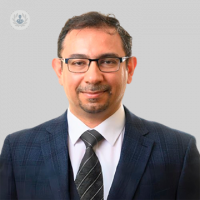The hidden struggle: how to recognise and address endometriosis symptoms
Written in association with:Endometriosis is a chronic condition where tissue similar to the lining of the uterus (endometrium) grows outside the uterus. This can lead to pain, heavy periods, and other symptoms. The exact cause is unknown, but it is believed to involve a combination of genetic, immune, and hormonal factors. A leading consultant obstetrician and gynaecologist provides a detailed insight into this important topic.

can significantly impact the management
What are the common symptoms of endometriosis?
Symptoms of endometriosis can vary greatly from one person to another. Common symptoms include:
- Pelvic pain: this is the most common symptom, often associated with menstrual periods. However, pelvic pain can also occur at other times during the menstrual cycle.
- Heavy menstrual bleeding: known as menorrhagia, this involves excessively heavy or prolonged periods.
- Pain during intercourse: pain during or after sexual activity is another sign.
- Pain with bowel movements or urination: this often occurs during menstrual periods.
- Infertility: endometriosis is found in a significant number of women who are infertile.
- Other symptoms: fatigue, diarrhoea, constipation, bloating, and nausea can also be present.
How can you recognise endometriosis symptoms early?
Recognising endometriosis early can be challenging due to the variability of symptoms and their overlap with other conditions. However, paying attention to persistent symptoms is crucial:
- Track your symptoms: maintain a diary of your menstrual cycle, pain levels, and other symptoms. This can help you and your doctor identify patterns.
- Be honest about pain levels: don't dismiss pain as a normal part of menstruation. Severe or persistent pain should be evaluated by a healthcare professional.
- Monitor changes: note any new symptoms or changes in your menstrual cycle that may indicate endometriosis.
When should you see a doctor?
It is advisable to consult a healthcare provider if you experience:
- Severe or debilitating pain during menstruation or at other times.
- Unusual bleeding patterns or significant changes in menstrual flow.
- Pain during intercourse or bowel movements.
- Difficulty conceiving, especially if other symptoms are present.
How is endometriosis diagnosed?
Diagnosis typically involves:
- Medical history and physical examination: your doctor will ask about your symptoms and perform a pelvic examination.
- Imaging tests: ultrasound or MRI scans may be used to identify cysts associated with endometriosis.
- Laparoscopy: this minimally invasive surgery allows a doctor to view the inside of the pelvis and make a definitive diagnosis by visualising and possibly biopsy the tissue.
What are the treatment options for endometriosis?
Treatment options vary based on the severity of the symptoms and whether fertility is a concern:
- Medications: pain relief and hormonal therapies can help manage symptoms. Hormonal treatments can reduce or eliminate menstruation, which may alleviate symptoms.
- Surgery: in cases where medication is ineffective, surgery to remove endometrial growths may be considered.
- Lifestyle changes: some women find relief through diet changes, exercise, and stress management.
How can you manage endometriosis long-term?
Long-term management of endometriosis involves:
- Regular follow-ups: continuous monitoring by a healthcare provider helps manage symptoms and adjust treatment plans.
- Support networks: engaging with support groups and counselling can help cope with the emotional aspects of living with endometriosis.
- Self-care: prioritising overall health, including diet and exercise, can improve quality of life.
Recognising and addressing endometriosis early can significantly impact the management and quality of life for those affected. If you suspect you have endometriosis or experience symptoms, seeking medical advice promptly is essential. Early diagnosis and a tailored treatment plan can help manage symptoms and improve overall well-being.
Concerned about endometriosis? Arrange a consultation with Mr Oudai Ali via his Top Doctors profile.


